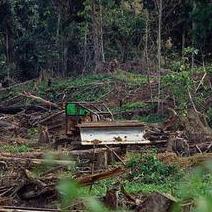 世界自然基金會(WWF)近期出版2010年《地球生命力報告》(Living Planet Report),該會主席利普(James Leape)指出,「過去40年來人類社會前所未有的財富以及福利,讓我們所居住的星球承受了無法永續發展的壓力。」
世界自然基金會(WWF)近期出版2010年《地球生命力報告》(Living Planet Report),該會主席利普(James Leape)指出,「過去40年來人類社會前所未有的財富以及福利,讓我們所居住的星球承受了無法永續發展的壓力。」
生命地球指數(Living Planet Index)是長期監測全球生物多樣性的眾多指標之一,首次發表於1998年的生命地球報告中,報告顯示:1970年至2007年間,指數下降達3成之多。
利普解釋說,「生命地球報告中,將生命地球指數與生態足跡和水足跡作出關聯,前者是衡量全球生物多樣性健康的指數,後兩者則用以衡量人類對地球自然資源的需求程度。」
根據2007年,也就是最新一期可用的數據顯示,人類的生態足跡已經超過地球的生物承載量的5成,生物承載量指的是產生再生能源以及吸收二氧化碳所需的面積。換言之,需要1.5個地球才足以供應人類所需。
利普寫道,「生態足跡顯示,與1960年代相比,我們對大自然的需求已經加倍,而生命地球指數顯示,物種健康的程度下降了30%,而物種健康狀況是我們所倚賴的生態系的根本。」
 生命地球報告顯示,如果全世界每個人的生活方式,與歐盟的居民平均水平一樣,依照現在對自然資源的消耗速率以及二氧化碳的排放量,我們需要2.8個地球。
生命地球報告顯示,如果全世界每個人的生活方式,與歐盟的居民平均水平一樣,依照現在對自然資源的消耗速率以及二氧化碳的排放量,我們需要2.8個地球。
歐盟27國現有5億居民,只佔了全球人口的7%,但所消耗的自然資源幾乎是全居民平均值的兩倍。
「歐盟區是世界人口最稠密也最富有的大洲之一,但是這樣的生活水準,是以消耗發展中國家以及未來世代的資源而來,」WWF歐洲政策辦公室主任隆(Tony Long)說,「事實是,歐盟是一個非常大的生態債務人,而地球這個債權人的資源已經無法繼續供應。」
今年的生命地球報告,預定配合聯合國在日本名古屋所舉辦的國際生物多樣性公約會議來發表,會議期間是10月18至29日。
這項公約是國際間最重要並具有約束力的自然保育條約,名古屋已經開始預備這項會議。
WWF在14日表示,名古屋會議對歐盟的決心將是一項測試,視其是否能在國內與全球,制止生物多樣性的流失,並面對其消費模式的財政成本。
在對2010年制止生物多樣性流失的目標失敗之後,歐盟27個會員國在3月份同意,「加強歐盟在制止全球生物多樣性流失的貢獻。」
歐盟27國的環境部長14日在盧森堡集會,對歐盟於名古屋會議中所要捍衛的立場達成共識。
在名古屋會議中,與會政府預計達成下列三項目標:
● 擬定新的策略計畫,在未來10年內,訂定具體目標,在2020年以前制止生物多樣性的流失。
● 議定取得協議以及利益分享計畫,以確保大家能公平分享遺傳基因資源的利益。
● 提出資源流通策略,以增加生物多樣性的資金。
「對於生物多樣性的流失,我們需要全球都認同的救援計畫,」隆說,「各國政府必須要改變想法,不再認為保護生物多樣性是一種花費,而要將之視為投資,以面對氣候變遷的挑戰,並為數十億人提供食物與營養,讓大家可以在這個星球上,長期且穩定的生活下去。」
這是生命地球報告第一次以國家收入來探討生物多樣性的變化趨勢,突顯出作者所謂的,「在低收入國家,生物多樣性以驚人的速度流失。」
生命地球報告警告,除非人們對保育跨出重大的進步,在短短的20年內,地球將受到更大的壓力。
報告指出,「在『一切照舊』的情況之下,前景十分堪憂,」「即使以聯合國對人口增長、消費狀況以及氣候變遷最保守溫和的預測,2030年的時候,人類需要兩個地球來吸收二氧化碳,並維持提供自然資源。」
「說白話一點,」利普寫道,「我們必須從非常少的資源中,想方設法去取得更多。消耗地球資源的速度,若比供應的速度更快,是在摧毀這個我們所倚賴的脆弱系統。我們必須以自然的尺度以及方式,來管理這些資源。」
"The unprecedented drive for wealth and well-being of the past 40 years is putting unsustainable pressures on our planet," writes WWF Director General James Leape in the newly released 2010 edition of WWF's Living Planet Report, a biennial survey on the state of the planet's health.
One of the longest-running measures of the trends in the state of global biodiversity, the Living Planet Index shows an overall trend since the first Living Planet Report was published in 1998: a global decline of almost 30 percent between 1970 and 2007.
Leape explains, "The Living Planet Report relates the Living Planet Index - a measure of the health of the world's biodiversity - to the Ecological Footprint and the Water Footprint - measures of humanity's demands on the Earth's natural resources."
In 2007, the most recent year for which data is available, humanity's Ecological Footprint exceeded the Earth's biocapacity - the area actually available to produce renewable resources and absorb CO2 - by 50 percent. In other words, it would take 1.5 Earths to keep up with humanity's consumption of natural resources.
"The Ecological Footprint shows a doubling of our demands on the natural world since the 1960s, while the Living Planet Index tracks a fall of 30 percent in the health of species that are the foundation of the ecosystem services on which we all depend," Leape writes.
The Living Planet Report shows that if everyone in the world lived like the average citizen of the European Union, the equivalent of 2.8 Earths would be required to keep up with current natural resource depletion rates and carbon dioxide emissions.
The 500 million inhabitants of the 27 European Union countries, although they make up just seven percent of the global population, are consuming almost twice as many natural resources as the global average.
"The European Union is one of the most densely populated and one of the richest continents in the world but these levels of well-being are being achieved at the expense of developing countries as well as future generations," said Tony Long, director of WWF European Policy Office. "The fact is the EU is a big ecological debtor which the resources of the planet can no longer sustain."
The launch of this year's Living Planet Report is timed to coincide with the United Nations' International Convention on Biodiversity taking place in Nagoya, Japan, from October 18 through 29.
This Convention is the most important internationally binding treaty on nature conservation and in Nagoya preliminary meetings have already begun.
The Nagoya conference will be a test of the European Union's determination to halt biodiversity loss, at home and globally, and to face up to the financial costs of its consumption patterns, WWF said today.
After the failure of the 2010 target to halt biodiversity loss, the 27 EU Member States agreed in March to "step up the EU contribution to averting global biodiversity loss."
The 27 EU Environment Ministers who are meeting in Luxembourg today will agree on the positions the EU will defend in Nagoya.
Governments meeting in Nagoya are expected to deliver:
● a new Strategic Plan to halt biodiversity loss by 2020 with concrete targets for the next 10 years
● a Protocol on Access and Benefits Sharing to ensure equitable sharing of benefits deriving from the use of genetic resources
● a Resource Mobilization Strategy to increase financing for biodiversity
"Biodiversity loss needs a globally agreed rescue plan," said Long. "Governments have to stop thinking about biodiversity protection as a cost and recognise it instead as an investment to fight climate change, provide food and nutrition for billions of people and to ensure long-term stability for life on this planet."
For the first time the Living Planet Report looks at trends in biodiversity by country income, which highlights what the authors call "an alarming rate of biodiversity loss in low-income countries."
Unless people make major conservation strides, the Living Planet Report warns that in just 20 years, the planet will be under even greater stress.
"Under a 'business as usual' scenario, the outlook is serious," the report states. "Even with modest UN projections for population growth, consumption and climate change, by 2030 humanity will need the capacity of two Earths to absorb CO2 waste and keep up with natural resource consumption."
"Put plainly," writes Leape, "we have to devise ways of getting as much, and more, from much less. Continuing to consume the Earth's resources more quickly than they can be replenished is destroying the very systems on which we depend. We have to move to managing resources on nature's terms and on nature's scale."
全文及圖片詳見:ENS報導







